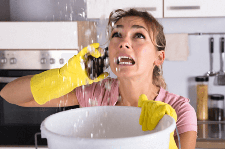 *New Case Law
*New Case Law
One of the primary purposes for which a homeowners’ association (“HOA”) is formed is to maintain and repair the HOA’s common areas, as well as any other areas designated within the HOA’s recorded Declaration of Covenants, Conditions and Restrictions (“CC&Rs”) (i.e., HOA Maintenance Areas). Faithfully executing the maintenance obligations under the CC&Rs is important to preserve property values and generally enhance the quality of life of all residents residing in the community. Failure to do so may expose the Association to liability.
For example, in the recent case of Sands v. Walnut Gardens Condominium Association, the California Appellate Court held the HOA could be responsible for damages sustained by a homeowner as a result of a plumbing leak originating from a pipe on the roof of the condominium building (i.e., HOA common area). ((2019) 35 Cal. App. 5th 174, 176.) In Sands, the HOA repaired the pipe and the roof, but did not compensate the homeowners for the damages they sustained to the interior of the unit and their personal property. The homeowners sued the HOA for breach of contract and negligence.
In addressing the former first (i.e., the breach of contract claim), the Court of Appeal noted that the HOA had a contractual obligation under the CC&Rs to maintain the common area in “a first-class condition.” (Id.) A jury could find that the HOA breached that contract by failing to perform preventative maintenance, and by failing to periodically inspect the pipes and roof. The Court dismissed the HOA’s argument “no evidence showed [that] the [HOA] was ‘on notice that it needed to make repairs or do something to the roof or the pipes.’” (Id.) Rather, it was sufficient that the HOA knew that no maintenance was being performed, which a jury could find as a breach of the CC&Rs’ requirement that the common area be maintained in a first-class condition.
However, as to the second cause of action for negligence, the Court sustained the trial court’s judgment of nonsuit (i.e., the homeowners failed to present sufficient evidence to conclude that the HOA was negligent). The Court noted that “the [HOA] had no independent duty as to the pipes and roof arising from tort law.” (Id. at p. 177.) In other words, absent a showing of a duty independent of the CC&Rs, an HOA cannot be held liable for the tort of negligence.
This case is important for several reasons. First, while the Rule of Judicial Deference generally requires courts to defer to maintenance decisions made by HOA boards even if a reasonable person would have acted differently in the same situation, the rule does not protect HOAs when they fail to perform any preventative maintenance and/or periodic inspections. Thus, a HOA should not wait until it receives maintenance requests and/or notice from homeowners concerning the need for common area repairs; rather, the Board should consult with experts and establish a preventative maintenance program addressing all common areas.
Second, there is no separate tort claim (e.g., negligence claim) for a HOA’s failure to maintain the common area. This is not to say, however, that a HOA will not be liable under a negligence theory for other reasons. For example, if a HOA voluntarily assumes a duty to protect residents from criminal activities and breaches that duty, the HOA may be held liable for negligence. (See Frances T. v. Village Green Owners Association (1986) 42 Cal. 3d 490.) The language contained in Frances T. also seems to suggest that a HOA may be found negligent for failing to maintain the common area which results in personal injuries. (Id. at p. 499.)
| The case of Sands v. Walnut Gardens highlights the importance of properly executing maintenance obligations under the CC&Rs. While the Board is granted judicial deference in determining how the common areas are to be maintained, a HOA may be held liable for its failure to investigate maintenance problems and to take reasonable action. (See Affan v. Portofino Cove Homeowners Association (2010) 189 Cal. App. 4th 930 [the deference afforded to HOA Boards may not extend to situations where the Board fails to act or to investigate the scope of required maintenance or repairs].) HOA Boards should therefore consult with experts to establish and execute an appropriate common area maintenance plan. |
-Blog post authored by TLG Attorney, Matthew T. Plaxton, Esq.
 HOA Lawyer Blog
HOA Lawyer Blog

